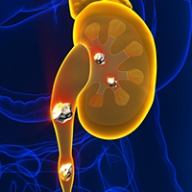The Pain and Prevention of Kidney Stones
Medically Reviewed by Kelly Maloney, MD
Stones in the kidney can often times go undiagnosed as they do not cause pain. When a stone leaves the kidney and travels through the ureter tube to the bladder, it can become lodged in the ureter. When the flow of urine out of the kidney is blocked, the kidney to swells resulting in pain, nausea and vomiting.
“Associated symptoms of kidney stones can also include a feeling of intense need to urinate, urine that is dark or red due to blood, urinating more often or a burning sensation during urination, nausea and vomiting,” says McLeod Urologist Dr. Kelly Maloney. “Stone size can range from 1 mm to over 2 cm. When a stone is greater than 10 mm the chance of it passing down the ureter tube spontaneously is less than 50%.”
PREVENTION
- Dehydration reduces urination, allowing minerals that cause kidney stones to settle in the kidneys. Be sure you drink 3 quarts or about 10 glasses of water day.
- Eating fruits and vegetables adds fiber, antioxidants, citrate and minerals that help keep stones from forming.
- Eat less meat, cutting back the times per week or portion size. Reduce salt (sodium) in your diet. Interestingly, calcium alone may not be your problem with kidney stones. Too much salt intake causes spikes in urine calcium, triggering formation of stones.
- Make sure you’re not ingesting too little calcium. Because inadequate calcium can increase your risk of kidney stones. An adequate daily intake can be found in milk (use low fat), yogurt or calcium fortified juices.
- Certain medications can reduce the calcium or uric acid in your body. Check with your Urologist, to see if a medication might help you and, if so, which ones.
TREATMENT
If your efforts at prevention fail, most stones pass out of the body as you urinate. If the stone fails to exit the body and continues to cause pain and nausea, a Urologist can offer a range of treatments to break up or remove the kidney stones:
- Medication, such as Flomax (Tamsulosin), improves the chances of passing the stone.
- Lithotripsy utilizes ultrasound shock waves to break the stones into smaller bits. The patient usually goes home the same day and returns to normal activities in 2-3 days. The pieces may pass out of the body over a several weeks.
- Ureteroscopy places a small instrument in the tube that passes urine out of the body or into the kidney. No incision is necessary. The patient usually goes home the same day as the treatment and returns to normal activities in 2-3 days.
- Percutaneous Nephrolithotomy (PCNL) may be recommend for larger stones. A small incision is made in the back or side to allow an instrument into the kidney to break up the stones, which are then suctioned out. They patient may stay in the hospital overnight and return to normal activities in 1-2 weeks.
- If the less invasive procedures fail to remove the kidney stones, more traditional open or laparoscopic surgery may be undertaken.
ACTION YOU CAN TAKE
If you experience the unmistakable symptoms of kidney stones, ask your personal physician to refer you to a urologist.
Find a Urologist near you.
Sources include: McLeod Health, National Kidney Foundation, National Institute of Diabetes/Digestive/Kidney Diseases, US Library of Medicine, Urology Care Foundation
-
McLEOD REGIONAL MEDICAL CENTER FLORENCE
843-777-2000 -
McLEOD DARLINGTON
843-777-1100 -
McLEOD DILLON
843-774-4111 -
McLEOD LORIS
843-716-7000 -
McLEOD SEACOAST
843-390-8100 -
McLEOD CHERAW
843-537-7881 -
McLEOD CLARENDON
803-433-3000



-
McLEOD REGIONAL MEDICAL CENTER FLORENCE
843-777-2000 -
McLEOD DARLINGTON
843-777-1100 -
McLEOD DILLON
843-774-4111 -
McLEOD LORIS
843-716-7000 -
McLEOD SEACOAST
843-390-8100 -
McLEOD CHERAW
843-537-7881 -
McLEOD CLARENDON
803-433-3000
 Find a Doctor
Find a Doctor  Locations
Locations  Services
Services 